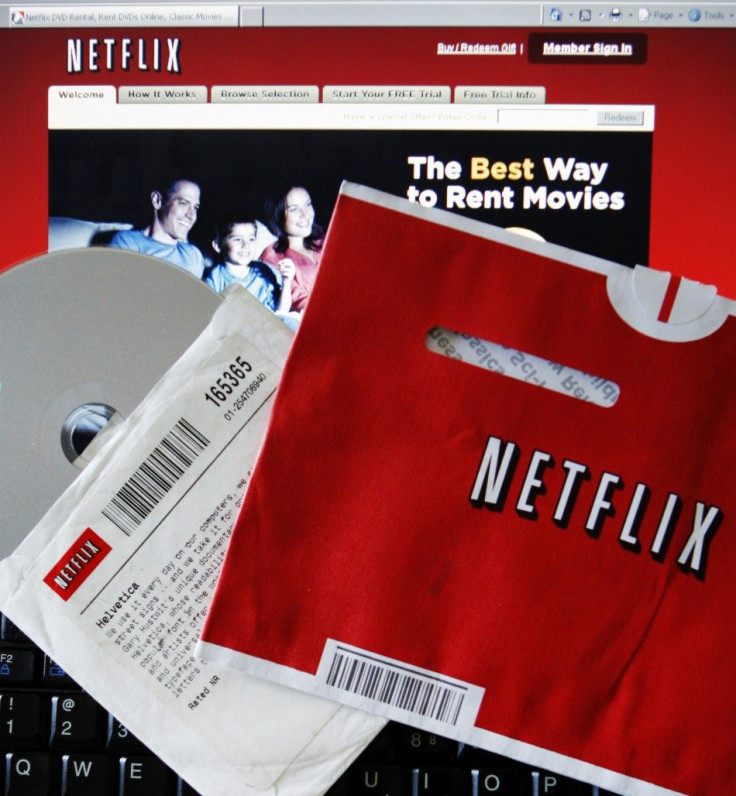Netflix Shares Hits 52-Week Low as Wheels Come Off Web 3.0 Party Wagon
Bad News on Tuesday Dwarfed by Overvaluation of Shares, Others in Virtual Commerce Space Share Same Fate

Netflix, Inc. (NASDAQ:NFLX) fell to a 52-week low of $69 during trading Tuesday, down 7.35 percent form the previous day's close of $74.47, as investors reacted negatively to the announcement the company would be taking on new debt and issuing more common stock. The company has lost almost four-fifths of its market value since a peak of $304.79 reached July 13.
Netflix has already been written off by many investors due to what appears to be an unsustainable cost-model and fumbling management, and the latest news seemed to only encourage more naysaying.
Netflix is selling $200 million in zero-coupon convertible bonds and issuing a further $200 million in common stock, adding that much more debt to a balance sheet that has seen liabilities balloon from $692 million to $1.57 billion over the last three quarters. The actions will dilute current shareholders about 10 percent, according to a Crédit Suisse analyst quoted in the Wall Street Journal.
A Bust in Momentum
But specifics are only one part of the story.
Like a horror movie that seems to be playing in every channel, the collapse in Netflix's valuation is part of a wider wave of grievous losses being felt by shares of companies focused on virtual commerce. After riding a surge of investor enthusiasm to valuation peaks in mid-summer, these companies had nowhere to go but down once traders checked their previous exuberance. Short-sellers, chomping at the bit to make bets against the stocks' heady fundamentals, are not helping either.
LinkedIn Corporation (NYSE:LNKD), OpenTable, Inc. (NASDAQ: OPEN), Ctrip.com International Ltd. (NASDAQ:CTRP), Travelzoo Inc. (NASDAQ:TZOO), SINA Corp. (NASDAQ:SINA), and Baidu, Inc. (NASDAQ:BIDU) are just some of the online-focused companies that achieved record highs during the early summer, but have seen share prices collapse since then, regardless of the general market direction.
Since hitting a post-IPO high of $110.50 on July 15, shares of online professional network LinkedIn have seen themselves expelled from the traders' circle of trust, driving shares down 37.1 percent to $69.50 during mid-day trading Tuesday. Restaurant reservation software company OpenTable, after a spring fling with investors that saw shares at $118.66 on April 25, is seemingly being stood up, down 71.55 percent during mid-day trading to $33.76. It also hit a 52-week low of $33.68 Tuesday.
Ctrip.com and Travelzoo, tiny high-flyers in the online travel reservation airspace dominated by competitors Expedia, Inc. (NASDAQ:EXPE) and priceline.com Incorporated (NASDAQ:PCLN), are parachuting back to Earth. Ctrip.com has gone from $50.57 on April 21 to $26.63 during trading today, down 47.34 for the period. Travelzoo, from $103.80 on April 25, was going for $26.74 Tuesday, a stomach-churning drop of 77.06 percent.
Meanwhile, shareholders in SINA and Baidu, which operate search portals and other online media properties in China, are probably not clicking the I'm Feeling Lucky button when looking up those companies' stock prices. Mid-day, SINA was trading at $65.50, down 53.34 from a peak of $140.38 reached April 26. Baidu fared somewhat better, down 19.89 percent to $125, from $156.04 on April 28.
The table below compares the loss in value experienced by these companies when compared to the S&P 500 Index.
| Company | Early Summer Peak Price | Date | 11/22 Mid-day Price | Change | Change in S&P 500 Index |
| $110.50 | July 15 | $69.50 | (37.1%) | (9.27%) | |
| OpenTable | $118.66 | April 25 | $33.76 | (71.55%) | (10.61%) |
| Ctrip.com | $50.57 | April 21 | $26.63 | (47.34%) | (10.61%) |
| Travelzoo | $103.80 | April 25 | $26.74 | (77.06%) | (10.61%) |
| SINA | $140.38 | April 26 | $65.50 | (53.34%) | (11.41%) |
| Baidu | $156.04 | April 28 | $125 | (19.89%) | (12.2%) |
A Question of Value
Each of the companies listed above has had specific issues over the past few months that have driven large sell-offs in stock. LinkedIn shares slumped this week after insiders were allowed to sell off shares vested during the IPO, and did so en masse. OpenTable missed Wall Street's revenue expectations for its recently-reported third quarter. SINA has been hurt by the Chinese government's crackdown on online freedoms.
But cutting through the fog of detail are the hard facts of value: how much the companies are really worth, as assessed by how much money they are expected to earn in the near future. It is by looking at these numbers the precipitous decline in share values can be understood. The S&P 500 price-to-earnings ratio, calculated by dividing the aggregated price of all stocks in that index to the earnings reported for those shares over the past twelve months, stands at 19.93.
The closest any of the companies on the list get to that figure is Ctrip.com, whose current P/E ratio stands at 23.36. But the loss in value since April suggests that number once exceeded 45. The ratio is elevated for both OpenTable and Baidu, at 43 and 48, respectively. And it is mind-bogglingly high for Travelzoo (740.84) and LinkedIn (1365.69). All this suggests further declines in share price could be on the way.
That hissing sound over the screams of buy-and-hold investors and joyous shouts of short-sellers? It's the air hissing its way out of the Web 3.0 bubble.
© Copyright IBTimes 2025. All rights reserved.





















